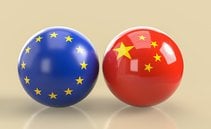European and Asian stock exchanges fell even more on Tuesday despite positive economic data from China.

European and Asian markets closed in red on Monday following a tense weekend when Iran directly attacked Israel for the first time in its history. On Saturday night, hundreds of battle drones were launched from Iranian territory directed to Southern Israel. The Israeli government claimed 99% of the drones were intercepted.
Oil prices did not immediately react to this event, though some experts believe they could reach up to $130 per barrel in case of an Israeli response. East Asia and Europe are some of the world’s largest oil importers, lacking significant reserves at home.
An increase in oil prices could therefore cause inflation to spike again, after years of record-high interest rates in the Eurozone. European oil and gas stocks fell 1.6% on Monday.
On Tuesday morning, the STOXX Europe 600 index dropped 1.29% after a slight increase on Monday.
London’s FTSE 100 and Frankfurt’s DAX dropped 1.52% and 1.45% respectively. FTSE MIB in Milan and the Iberian IBEX 35 fell by 1.7% and 1.6% respectively.
EU markets have mostly risen this year, hoping for a series of rate cuts by the European Central Bank. The STOXX Europe 600 rose 4.36% year-to-date. Geopolitical tensions and a comeback of inflation could, however, delay such cuts, likely resulting in a fall in equities too.
Asian markets follow China
On Monday, Asian stock exchanges also reacted negatively to Iran’s attack against Israel.
Japan’s NIKKEI and South Korea’s KOSPI fell by 1.94% and 2.28% respectively. In Australia, the S&P/ASX 200 index dropped 1.81%, while the overall CNBC Asia 100 index slipped by 2.35%.
Stock exchanges in China closed in red on Monday and Tuesday despite today’s news of better-than-expected GDP growth for the Asian giant. The Chinese economy expanded by 5.3%, more than forecast and in line with the 5% growth goal for the year.
However, the Shanghai stock exchange traded down 1.65% in intraday trading, while the Hang Seng index dropped 2.12% today. Shanghai trades domestic stocks, while the Hong Kong-based Hang Seng exchanges shares of offshore companies.
Despite the outstanding Q1 growth, China’s exports declined much more than expected in March, decreasing hopes for a recovery after a disappointing 2023. China is the world’s biggest exporter but stagnated after the COVID-19 pandemic due to a lack of global demand and geopolitical isolationism.
Iran’s attack will likely impact China’s imports and exports even more, meaning the whole global economy entered a new period of uncertainty.





